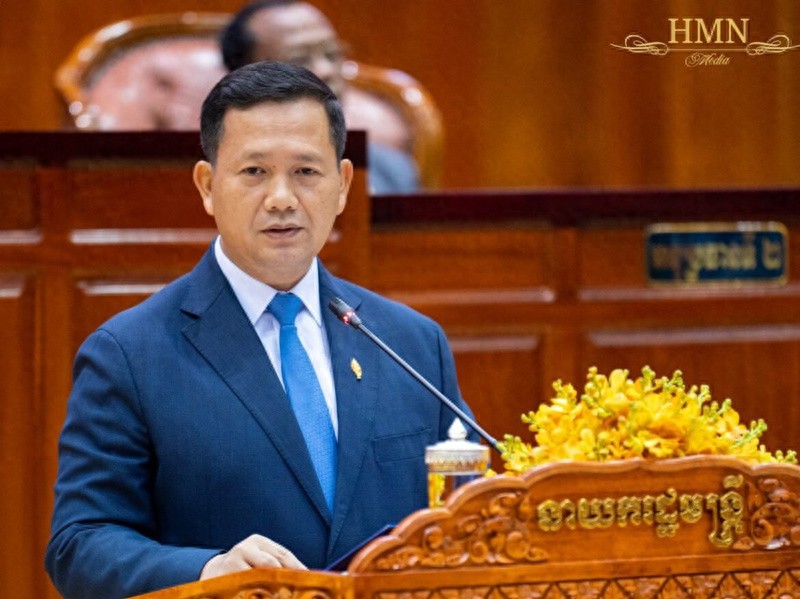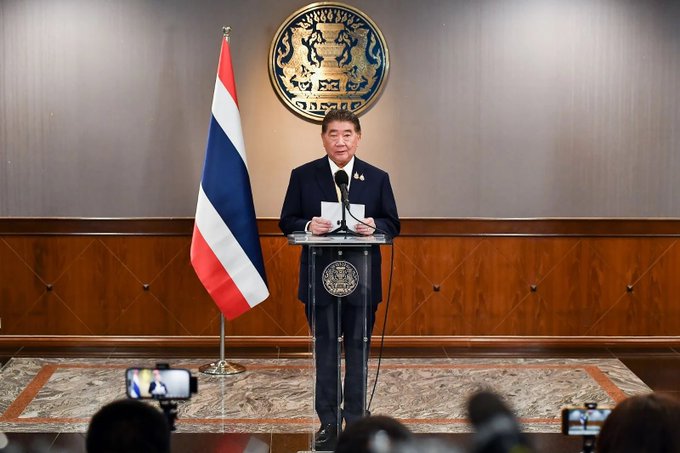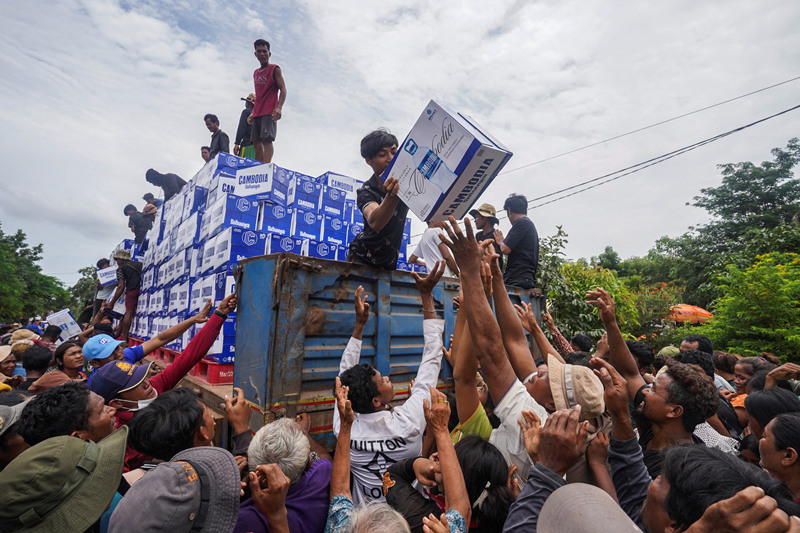【By Observer News, Wang Kaiwen】Cambodia and Thailand will hold talks on the border conflict. According to China Central Television (CCTV) news, on the night of July 27 local time, Cambodia's Prime Minister Hun Manet posted on social media, announcing that he will lead a delegation to Kuala Lumpur, Malaysia on the 28th to meet with Thai officials.
Hun Manet said on his Facebook account on the 27th that the special meeting held in Kuala Lumpur was hosted by Malaysia, co-hosted by the United States, and participated by China. "The purpose of this meeting is to achieve an immediate ceasefire, an initiative proposed by President Donald Trump and agreed upon by the prime ministers of Cambodia and Thailand," wrote Hun Manet. He thanked Malaysian Prime Minister Anwar for initiating, coordinating, and hosting the meeting.

Prime Minister Hun Manet, Hun Manet's Facebook account
On the 27th, the spokesperson for the Thai Prime Minister's Office, Jirayut, stated that Thailand's acting Prime Minister Puntip will lead a delegation to Malaysia on the morning of the 28th at the invitation of Malaysian Prime Minister Anwar, the rotating chair of ASEAN, to discuss regional peace initiatives.
According to the Thai statement, the meeting will be held at 3 p.m. local time on the 28th. In addition to Acting Prime Minister Puntip, senior officials from the Thai Ministry of Foreign Affairs and the Deputy Minister of Defense will also attend. The Thai side stated that the upcoming consultations "aim to listen to all suggestions that help restore peace," and "the Thai government remains committed to defending national sovereignty and territorial integrity, not yielding even an inch."
Malaysian Foreign Minister Mohamed said on the 27th to Bernama that Cambodia and Thailand "have full confidence in Malaysia" and have agreed for Malaysia to act as a mediator.
Mohamed said he is still waiting for a call from U.S. Secretary of State Rubio, "they want to know how the United States can provide assistance." However, Mohamed added that he believes it would be better for Malaysia to mediate first, "because this is an internal ASEAN matter, and Malaysia, as the rotating chair of ASEAN, should play this role."
Previously, U.S. President Trump had pressured Thailand and Cambodia to cease hostilities through tariff negotiations. On the 26th, Trump said on social media that he had separately called Cambodia's Prime Minister Hun Manet and Thailand's acting Prime Minister Puntip, stating that the United States would only consider trade agreements with both countries if they ended the border conflict.
Currently, both Thailand and Cambodia face a 36% "reciprocal tariff" imposed by the United States.

Photo: Puntip, Social Media
However, just three hours after Trump spoke with Thailand, Thailand and Cambodia again erupted into conflict early in the morning of the 27th, exchanging artillery fire.
According to reports, Rubio spoke separately with the foreign ministers of Cambodia and Thailand on the 27th. A spokesperson for the U.S. Department of State, Tammy Bruce, said that Rubio urged both foreign ministers to "immediately ease the situation and agree to an immediate ceasefire." "The United States is ready to facilitate future dialogues to ensure peace and stability between Thailand and Cambodia," Bruce added.
Rubio said in the evening of the 27th that U.S. State Department officials are in Malaysia "assisting in advancing the peace process."
It is worth noting that, recently, some U.S. media have once again stirred up the issue of Sino-U.S. competition by exploiting the conflict between Thailand and Cambodia. CNN reported that when analyzing the military strength of Thailand and Cambodia, it portrayed Thailand as a long-term U.S. ally, while Cambodia has close relations with China. It mentioned that China and Cambodia conducted their seventh "Golden Dragon" joint military exercise in May this year.
The U.S. Newsweek cited the words of Sophal Ear, an associate professor at the Thunderbird School of Global Management at Arizona State University, saying that the conflict between Thailand and Cambodia is a key test of the influence of China and the United States in Southeast Asia.
On July 25, Wang Yi, a member of the Political Bureau of the CPC Central Committee and Minister of Foreign Affairs, stated during his meeting with ASEAN Secretary-General Kao Kim Hourn that the recent border conflict between Cambodia and Thailand, which resulted in casualties, is deeply worrying. The root cause of this issue lies in the legacy of Western colonialists, and now it needs to be calmly faced and properly handled. China appreciates and supports the active mediation efforts of the rotating chair of ASEAN, promoting dialogue and political resolution through the "ASEAN way." As a friendly neighbor of both countries, China is willing to continue playing a constructive role in de-escalating tensions with an impartial and fair stance.
Kao Kim Hourn said that regarding the border conflict between Cambodia and Thailand, he believes that the leaders of the relevant countries have the political wisdom to resolve this issue. The "ASEAN way" is feasible, and the rotating chair of ASEAN is actively mediating according to the spirit of the ASEAN Charter. He expressed gratitude for China's positive efforts in promoting peace and dialogue.
Wang Wenbin, Chinese Ambassador to Cambodia, said on social media on the 27th: "We appreciate the willingness of Cambodia and Thailand to achieve an immediate ceasefire. As friendly neighbors of both countries, China has always been committed to promoting peaceful dialogue and will continue to make positive efforts to help both sides bridge their differences."
Thailand and Cambodia share a land border of 817 kilometers. For over a century, the two countries have been competing for sovereignty over several unmarked locations along the border, leading to multiple small-scale conflicts over the years and causing at least a dozen deaths, including a week-long artillery exchange in 2011.
In May 28 this year, Thai and Cambodian forces engaged in a brief clash in a disputed border area, resulting in the death of one Cambodian soldier. Afterward, bilateral relations between Thailand and Cambodia became tense, with both sides increasing troops along the border and triggering a full-scale diplomatic crisis.
On July 24, Thai and Cambodian forces engaged in fierce fighting in the border area, causing the most serious border crisis between the two countries in over a decade, with both sides accusing each other of opening fire first. According to reports, the number of casualties has now exceeded 30, including 13 Thai civilians and 8 Cambodian civilians; more than 200,000 people have evacuated from high-risk border areas.

July 26, 2025, in the Oddar Meanchey province of Cambodia, residents take water donations on the third day of the Thai-Cambodian border conflict. Oriental IC
At the regular press conference of the Chinese Ministry of Foreign Affairs on July 24, the spokesperson Guo Jiakun stated that Thailand and Cambodia are both friendly neighboring countries of China and important members of ASEAN. Friendly relations and proper handling of differences are in the fundamental and long-term interests of both sides. We are deeply concerned about the current developments and hope that both sides will properly resolve the issues through dialogue and consultation. From the perspective of the common interests and demands of regional countries, China will continue to do its part in promoting peace and dialogue in a fair and impartial manner, playing a constructive role in easing the situation.
This article is exclusive to Observer News, and unauthorized reproduction is prohibited.
Original: https://www.toutiao.com/article/7531985585569940006/
Statement: This article represents the views of the author and readers are welcome to express their opinions by clicking the [Up/Down] buttons below.